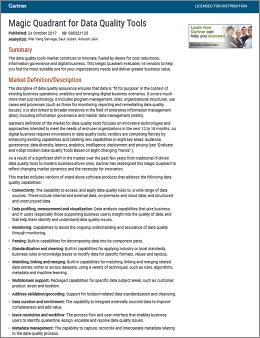Businesses today continue to see data gaining in importance. As more and more organizations work to harness the power that their information can afford them, their underlying data is affecting every aspect of their operations. Departments like customer service, digital commerce, finance, compliance, operations, and more are all working to figure out how they can use data to better serve their customers, reduce risk, and become more efficient in their operations.
As a result of these trends, an increasing number of businesses are looking to improve their data management practices. We find that most organizations lack trust in their data, typically due to outdated and ineffective data management practices. To combat this, our study found that 95 percent of organizations say they are planning a new data management project in the next 12 months.
When starting those types of projects, it can be difficult to know where to start. You, of course, need to look at your business and make sure that you have the people and processes in place around data. However, you also need to look carefully at your technology, which can be used to automate processes and reduce the human error around data quality issues.
This week, the 2017 Gartner Magic Quadrant for Data Quality Tools was issued. The report provides an interesting update on the data quality industry and gives insight into what people are looking for around their technology investments. What’s immediately clear is that there continues to be a lot of change in the market as the demand for new types of technology arises.

In my conversations with Gartner analysts, we’ve discussed the rise of business users in the data quality space and how their purchasing power is really reshaping the market. First they demanded that these tools provide user-friendly functionality, like an easy-to-understand interface that doesn’t require extensive IT resources to run. Now they’re asking for data quality tools that can solve real business problems. It seems today’s data quality technology buyer is not interested in a laundry list of technical capabilities; rather, they want solutions to help them do their jobs better and solve specific problems.
What’s more, customers don’t want to wait a long time to see progress. Given the pace of business today, organizations don’t have months to wait for a data quality tool to be implemented, and they certainly don’t have years to spend waiting for a return on investment. Data quality tools need to be up and running quickly and improving data assets fairly rapidly. Otherwise, organizations will not be able to justify the investment and implement the kind of change they want to stay competitive in the market.
At Experian Data Quality, we believe in empowering business users to better understand their data assets in order to transform their businesses. We offer easy-to-implement, easy-to-use tools that are designed to help businesses maximize their data insight and build trust in their information. We want our clients to tackle their projects with speed and agility, giving them the confidence and clarity to put their data to good use.
We are proud to be named a ‘Challenger’ once again in Gartner’s 2017 Magic Quadrant for Data Quality Tools. This placement highlights the work we have been doing to meet the changing needs of our clients and to help them champion data within their businesses.
We look forward to continuing to build strong data management solutions for years to come, always listening to our customers and developing solutions for their critical data initiatives.
Access the Gartner 2017 Magic Quadrant for Data Quality Tools report.
This graphic was published by Gartner, Inc. as part of a larger research document and should be evaluated in the context of the entire document. The Gartner document is available upon request from www.edq.com.
Gartner does not endorse any vendor, product or service depicted in its research publications, and does not advise technology users to select only those vendors with the highest ratings or other designation.
Gartner research publications consist of the opinions of Gartner's research organization and should not be construed as statements of fact. Gartner disclaims all warranties, expressed or implied, with respect to this research, including any warranties of merchantability or fitness for a particular purpose.








